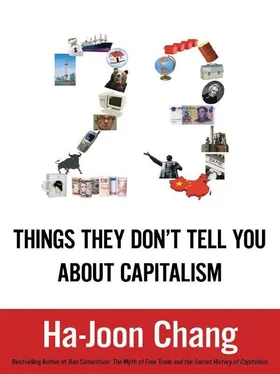The immediate income redistribution into profits was bad enough, but the ever-increasing share of profit in national income since the 1980s has not been translated into higher investments either ( see Thing 13 ). Investment as a share of US national output has actually fallen, rather than risen, from 20.5 per cent in the 1980s to 18.7 per cent since then (1990–2009). It may have been acceptable if this lower investment rate had been compensated for by a more efficient use of capital, generating higher growth. However, the growth rate of per capita income in the US fell from around 2.6 per cent per year in the 1960s and 70s to 1.6 per cent during 1990–2009, the heyday of shareholder capitalism. In Britain, where similar changes in corporate behaviour were happening, per capita income growth rates fell from 2.4 per cent in the 1960s–70s, when the country was allegedly suffering from the ‘British Disease’, to 1.7 per cent during 1990–2009. So running companies in the interest of the shareholders does not even benefit the economy in the average sense (that is, ignoring the upward income redistribution).
This is not all. The worst thing about shareholder value maximization is that it does not even do the company itself much good. The easiest way for a company to maximize profit is to reduce expenditure, as increasing revenues is more difficult – by cutting the wage bill through job cuts and by reducing capital expenditure by minimizing investment. Generating higher profit, however, is only the beginning of shareholder value maximization. The maximum proportion of the profit thus generated needs to be given to the shareholders in the form of higher dividends. Or the company uses part of the profits to buy back its own shares, thereby keeping the share prices up and thus indirectly redistributing even more profits to the shareholders (who can realize higher capital gains should they decide to sell some of their shares). Share buybacks used to be less than 5 per cent of US corporate profits for decades until the early 1980s, but have kept rising since then and reached an epic proportion of 90 per cent in 2007 and an absurd 280 per cent in 2008. [6] See W. Lazonick and M. O’Sullivan, ‘Maximising shareholder value: A new ideology for corporate governance’, Economy and Society , 2000, vol. 29, no. 1, and W. Lazonick, ‘The buyback boondoggle’, Business Week , 24 August 2009.
William Lazonick, the American business economist, estimates that, had GM not spent the $20.4 billion that it did in share buybacks between 1986 and 2002 and put it in the bank (with a 2.5 per cent after-tax annual return), it would have had no problem finding the $35 billion that it needed to stave off bankruptcy in 2009. [7] Lazonick, op. cit.
And in all this binge of profits, the professional managers benefit enormously too, as they own a lot of shares themselves through stock options.
All this damages the long-run prospect of the company. Cutting jobs may increase productivity in the short run, but may have negative long-term consequences. Having fewer workers means increased work intensity, which makes workers tired and more prone to mistakes, lowering product quality and thus a company’s reputation. More importantly, the heightened insecurity, coming from the constant threat of job cuts, discourages workers from investing in acquiring company-specific skills, eroding the company’s productive potential. Higher dividends and greater own-share buybacks reduce retained profits, which are the main sources of corporate investment in the US and other rich capitalist countries, and thus reduce investment. The impacts of reduced investment may not be felt in the short run, but in the long run make a company’s technology backward and threaten its very survival.
But wouldn’t the shareholders care? As owners of the company, don’t they have the most to lose, if their company declines in the long run? Isn’t the whole point of someone being an owner of an asset – be it a house, a plot of land or a company – that she cares about its long-run productivity? If the owners are letting all this happen, defenders of the status quo would argue, it must be because that is what they want, however insane it may look to outsiders.
Unfortunately, despite being the legal owners of the company, shareholders are the ones who are least committed among the various stakeholders to the long-term viability of the company. This is because they are the ones who can exit the company most easily – they just need to sell their shares, if necessary at a slight loss, as long as they are smart enough not to stick to a lost cause for too long. In contrast, it is more difficult for other stakeholders, such as workers and suppliers, to exit the company and find another engagement, because they are likely to have accumulated skills and capital equipment (in the case of the suppliers) that are specific to the companies they do business with. Therefore, they have a greater stake in the long-run viability of the company than most shareholders. This is why maximizing shareholder value is bad for the company, as well as the rest of the economy.
The dumbest idea in the world
Limited liability has allowed huge progress in human productive power by enabling the amassing of huge amounts of capital, exactly because it has offered shareholders an easy exit, thereby reducing the risk involved in any investment. However, at the same time, this very ease of exit is exactly what makes the shareholders unreliable guardians of a company’s long-term future.
This is why most rich countries outside the Anglo-American world have tried to reduce the influence of free-floating shareholders and maintain (or even create) a group of long-term stakeholders (including some shareholders) through various formal and informal means. In many countries, the government has held sizeable share ownership in key enterprises – either directly (e.g., Renault in France, Volkswagen in Germany) or indirectly through ownership by state-owned banks (e.g., France, Korea) – and acted as a stable shareholder. As mentioned above, countries like Sweden allowed differential voting rights for different classes of shares, which enabled the founding families to retain significant control over the corporation while raising additional capital. In some countries, there are formal representations by workers, who have a greater long-term orientation than floating shareholders, in company management (e.g., the presence of union representatives on company supervisory boards in Germany). In Japan, companies have minimized the influence of floating shareholders through cross-shareholding among friendly companies. As a result, professional managers and floating shareholders have found it much more difficult to form the ‘unholy alliance’ in these countries, even though they too prefer the shareholder-value-maximization model, given its obvious benefits to them.
Being heavily influenced, if not totally controlled, by longer-term stakeholders, companies in these countries do not as easily sack workers, squeeze suppliers, neglect investment and use profits for dividends and share buybacks as American and British companies do. All this means that in the long run they may be more viable than the American or the British companies. Just think about the way in which General Motors has squandered its absolute dominance of the world car industry and finally gone bankrupt while being on the forefront of shareholder value maximization by constantly downsizing and refraining from investment ( see Thing 18 ). The weakness of GM management’s short-term-oriented strategy has been apparent at least from the late 1980s, but the strategy continued until its bankruptcy in 2009, because it made both the managers and the shareholders happy even while debilitating the company.
Читать дальше






![Ally Carter - [Gallagher Girls 01] I'd Tell You I Love You But Then I'd Have to Kill You](/books/262179/ally-carter-gallagher-girls-01-i-d-tell-you-i-lo-thumb.webp)





